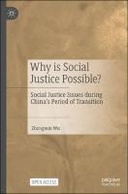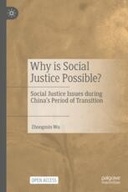Explore

This is an open access book. This OA book contains extensive research on social justice during China’s transition period. Rather than taking a macro-historical approach, or looking at social justice from a philosophical perspective, the book focuses on relevant theories and justice at a meso-level. It looks at the basis for social justice, and details the basic values and the basic standpoints when it comes to social justice. It differentiates between the concepts of justice, righteousness, fairness and equality. It then lays out three social justice rules (related to equal opportunities, distribution and social adjustment), and discusses the ideas of intergenerational justice and procedural justice. The book looks from a sociological point of view at social justice during China's period of transition. It focuses on how certain rules affect the social strata, and how they lead to discrimination, inequalities, liberty, equality, universal justice and/or differential justice. This book assesses improper pursuits of social justice in China. It also looks at how the ideas of liberty and equality have evolved, and some of the key problems over the last 70 years. This book also explains some of the more popular social topics that foster empirical discussions. Since the reform and opening-up era, China has made great achievements when it comes to social development. The country has made notable progress with social justice. There are more equal opportunities than ever before. Nevertheless, there remain worrying problems when it comes to the idea of justice. To some extent, these problems offset the achievements. In some form, the development processes have been somewhat misguided, and these have had a negative impact on Chinese society and how it functions and develops. Therefore, this book is of theoretical and practical significance when it comes to social justice research.
This book is included in DOAB.
Why read this book? Have your say.
You must be logged in to comment.
Links
DOI: 10.1007/978-981-97-5380-2web: https://link.springer.com/book/10.1007/978-981-97-5380-2
Editions



